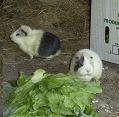 |
Bungala Ridge Permaculture Gardens REDUCE ... REUSE ... RECYCLE ... REPAIR ... RETURN ... REVEGETATE ... REPLENISH |
||||||||
|
|||||||||
|
|
What is a Permaculture Lifestyle? I'd love to say we've progressed a long way toward our goal since last writing but it hasn't happened quite like that... Some days I feel like we aren't permaculturalists at all. Some days I feel like we're moving further and further away from this reality... According to the Permaculture Visions Assessment of Permaculture Design checklist we're doing fine on most counts. We generate our own power from wind and solar energy, heat our water with solar power and wood collected from excess wood grown on our property, capture and use rain water both in tanks and in the soil, grow our own mulch, create our own compost, make good use of shelter belts, designed for catastrophe and have a bushfire plan, incorporated future generation needs into our design, utilise a variety of small animals and so on. Where we fall down, I believe, is in answering this question "How much of the system provides the family's needs?" To answer this question I need to define our family's needs. I need to look at my needs, the needs of my partner and our two grown sons. My sons are totally 'into' cars right now. They love to tinker, often making parts for their cars using the lathe handed down to them by my late father-in-law. I'm in awe of their natural ability to work metal into whatever shape and function they require. They are true recyclers, preferring to work with wrecks and used parts before heading off to the auto parts store. Building and modifying their cars to improve handling and performance may sound at first to be in tune with permaculture principles, but I doubt that this kind of dedication to cars is in any way 'green'... Add to that their other passion - off road driving - and it's easy to see why I have qualms about answering the checklist question. How can any permaculture system cater to the needs of off-roading adventurers? They do their best to look after the environment when they go tearing off through the bush or along the beach in remote areas - stay on denuded areas, avoid vegetation, only use areas set aside for such activities. I ask myself, is this obsession with cars a guy thing, something youngsters have to go through? We talk about balancing greenhouse gas emissions by growing and planting trees, but they have yet to turn this talk into action. I can't complain too much. When younger these kids grew and planted thousands of tree seedlings. Perhaps they'll be ideal conservationists once they've learned whatever it is they need to learn from this oily rag soaked stage of their lives? On the other hand, as mentioned above, these young men do their best to avoid buying anything new, apart from clothes and even then they are frugal with their requirements and what they do have is thoroughly worn out before being replaced. And they are both handy men, able to repair most things electronic, wooden, mechanical, computer, whatever. Their list of skills is impressive. They're pretty good in the domestic department too. Good catches for any young ladies passing by... We've answered their need by building a huge garage. This doubles as a workshop and garage space for Roger's classic cars... did I forget to mention he collects cars too? Hmmm. I think every permaculture property needs a huge workshop and can't imagine how we did without a garage for two decades. Fixing cars lying on a gravel driveway in all kinds of weather isn't my idea of a good time. Most of our garages, however, have been used as living spaces over the years... Behind the garage, down the hill a bit, is our 'depot'. This is another essential permacutlure element. It's where we put all the 'stuff' we don't need right now but can't bear to part with: there's a good chance it can be recycled in a year's (or five!) time. We have separate areas for metal and wood; a pile of wood to be sorted into craft timber or firewood; neat piles of bricks and pavers and a pile of anything else that might possibly be recycled one day. Every so often we load up the trailer and shift a load to the recyclers, but mostly we add to the heaps. As the size of our 'depot' grows I have to wonder just how permaculturally sound this 'rubbish dump' by another name actually is? Examining the needs of myself and my partner is fraught with confusion: what are real needs and what are needs based on wants that aren't really necessary? For instance, my writing requires that I own and use a laptop, which needs to be upgraded every couple of years as I become a more competent user of information technology. My writing doesn't bring much of an income and some might say it's really a time consuming hobby that keeps me from doing more permaculturally minded pursuits, such as growing vegies for the dinner table. My publishing business - albeit a tiny one - has me in constant conflict. Even though my printer uses plantation timber I can't help but feel that writing and publishing anything at all on paper encourages an industry that destroys what little natural forest habitat there is left on this planet. Although I feel the need to write each day, is this a real need or is this indulgence? I can argue that my writing activities are building towards an independent income: one day our publishing business will pay the bills we can't avoid. That salves my conscience for awhile. Our needs are simple but we're often distracted. We like watching movies at the end of the day. Neither of us are readers: we prefer to cuddle up and share a movie than be individually engrossed in dissimiliar fantasy worlds. We love going to the cinema but on the way home talk about buying a big screen television, LCD of course - it's the only type our power system can handle. We haven't succumbed yet. We are both addicted to building. We're happiest when we're tackling a new project: building a room, a piece of furniture, a new garden bed, a verandah, anything at all! We get so engrossed in the task that we forget to go for that walk, sit and meditate, do a few simple stretching exercises, learn Tai Chi like we promised ourselves, grow vegies or cook nutritious meals... We are yet to embrace the 'slow food' movement. Are we stuck in bad habits or are we honouring who we are right now at this stage of our lives? It seems that changing our ways requires immense effort. I console myself by affirming that lasting change is usually slow change... But somedays the pace is so slow it's barely noticeble! We don't grow our food. We purchase it from our local supermarket and butcher. The supermarket employed our eldest child for five years, giving her the start she needed in the retail industry where she is still happily employed. We collect the fruit and vegetable scraps every day to feed to our animals which provide us with nutrients for our compost bins. I'm sure we could be more self-reliant and buy less packaged food. It's embarrassing how full our kerbside recycling bin is each month. It's easy to feel that we fall way short of permaculture ideals: I'm sure every permaculturalist feels like this on blue days. Do we have to be perfect permaculturalists to call ourselves permaculturalists? I'm glad I ran through Permaculture Visions checklist - we're well and truly on our way and I can see that progress is happening, abeit slowly, towards creating our property into a permaculture haven. "Above all, the permaculture garden should be somewhere for relaxation and enjoyment, not yet another place to get hung up about whether or not you are 'doing it right' or meeting others' expectations."
|
Hot Links!
This site is sponsored by |
|||||||
|
|
|
|
|||||||




